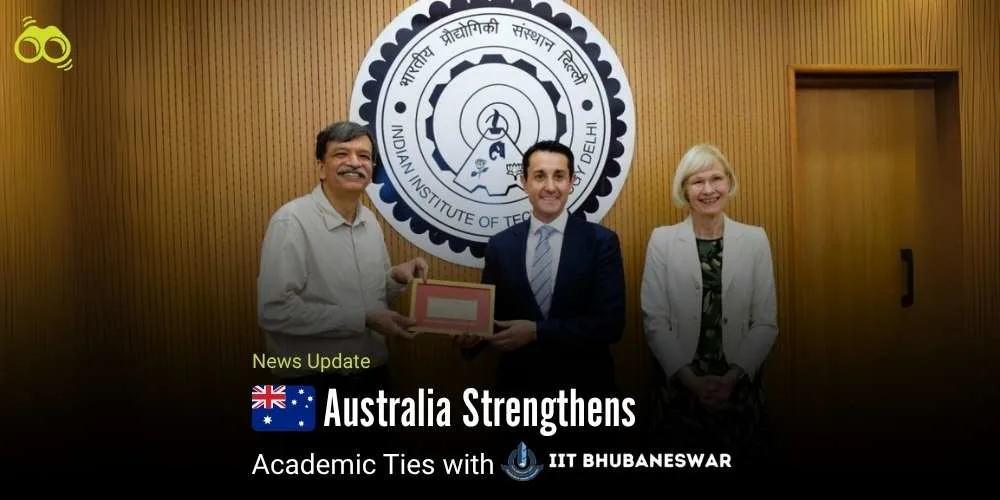Bhubaneswar Emerges as Key Hub Ahead of Australia–India Education Council Meeting
Australian Delegation Explores Research and Innovation Collaboration at IIT Bhubaneswar
On 30 September 2025, the Australian High Commissioner to India, Mr Philip Green OAM, visited IIT Bhubaneswar to support the growing academic partnership between India and Australia. He was joined by Mr George Thiveos, working on education and research and Ms Angelina Nair, who helps to manage research visits. This expert team met with senior professors and researchers at the institute to talk about how both countries can work together on research and innovation. The visit was an important step in building stronger ties between Australian universities and IIT Bhubaneswar.
The visit was aimed at gaining further insight into the institute's intellectual priorities and its contribution to Odisha's wider innovation landscape. Mr Green had a meeting with Prof Shreepad Karmalkar, Director, IIT Bhubaneswar, and Prof Rajesh Roshan Dash, Dean (Alumni, Corporate & International Relations-In-Charge), Prof Dinakar Pasla, Dean (Sponsored Research & Industrial Consultancy), Heads of Schools, and faculty members. Members of the Research and Entrepreneurship Park (REP) also joined the discussions.
The presentation by Prof Karmalkar detailed the unique competencies of the institute in teaching–learning, entrepreneurship development, industry–academia linkages, and mental wellness initiatives. He evoked that IIT Bhubaneswar is also committed to promoting inclusive education along with student wellbeing, along with academic excellence.
India is the second largest source of international students for Australia. The delegation from Australia has shown keen interest in developing a twin educational relationship with India regarding establishing new campuses, running joint academic programs, and sharing research collaboration in India, especially with reference to Odisha. This visit also preceded the upcoming meeting of the Australia-India Education and Skills Council, which will be held in Bhubaneswar in December 2025.
Talks centred on linking IIT Bhubaneswar's research intensity with Odisha's drivers of economy and long-term development objectives. Existing faculty members already involved in international university collaborations with Australian universities presented the current situation and indicated areas for future engagement. They were climate resilience, renewable energy, advanced materials, and teacher education.
However, the High Commissioner's visit represented a clear illustration of these innovations, which benefit cooperation and technology-driven development research in Bhubaneswar. As one can see, the universities in Bhubaneswar's Knowledge City are narrating richly laced stories of preparedness for international collaboration. Altogether, Bhubaneswar has come to steer forward the futures of education, technology for sustainability, respect for tradition, and cooperation.
Editors Note:
The high commissioner's visit to IIT Bhubaneswar will further work on mutual understanding and serve as the platform from which high-level cooperation in educational and research cooperation between Australia and India will flourish. It again embodies a clear perspective from two countries to nurture a conducive learning environment to embed scientific temperament, spur innovation, and cultivate academic relationships for all times. In this context, the visit underlined the strategic advantages of international cooperation in higher education and showed how institutions like IIT Bhubaneswar are actually leading drivers for the global research agenda while contributing to local development. Through stellar leadership, top-notch infrastructure operating under excellence, IIT Bhubaneswar is certainly a major force to reckon with in India's academia, a thesis to which the institution is an important partner in Australia's international education agenda. This interaction marks a transition from transactional student mobility to greater institutional collaboration. If it continues, such collaborations can potentially achieve long-term effects in education, research, and local development. IIT Bhubaneswar's forward-thinking strategy and strategic positioning render it an attractive collaborator in this shared vision.
Skoobuzz underlines that the visit reflects a growing commitment to meaningful academic collaboration between India and Australia. With its strong research base and global outlook, IIT Bhubaneswar is well placed to lead future partnerships that benefit students, institutions, and regional development alike. This marks a promising step towards deeper, long-lasting ties in education and innovation.
FAQs
1. Why did the Australian High Commissioner visit IIT Bhubaneswar?
The visit aimed to strengthen the academic and research partnership between India and Australia, explore collaborative opportunities, and understand the institute’s research priorities within Odisha’s innovation ecosystem.
2. Which research labs were visited (CRIF, REP, SiCRIC)?
The delegation toured three key research facilities at IIT Bhubaneswar: – Central Research and Instrumentation Facility (CRIF) – Research and Entrepreneurship Park (REP) – Silicon Carbide Research and Innovation Centre (SiCRIC)
3. What collaborations are planned between India and Australia?
Planned collaborations include joint academic programmes, research partnerships, faculty exchanges, and the development of new campuses. The focus is on building a two-way education relationship that supports skills development and innovation.
4. When is the Australia–India Education and Skills Council meeting?
The meeting is scheduled to take place in Bhubaneswar in December 2025.
5. Who from IIT Bhubaneswar met the Australian delegation?
The delegation met with Prof Shreepad Karmalkar (Director), Prof Rajesh Roshan Dash (Dean, Alumni, Corporate & International Relations-In-Charge), Prof Dinakar Pasla (Dean, Sponsored Research & Industrial Consultancy), Heads of Schools, faculty members, and representatives from the Research and Entrepreneurship Park.














0 Comments (Please Login To Continue)